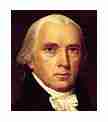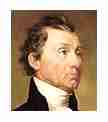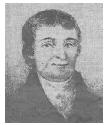Biographies - M through O
 MADISON,
James, a Delegate and a Priceless National Treasure Recovered Representative from Virginia and 4th President of the United States; born in Port Conway, King George County, Va., March 16, 1751; studied under private tutors and was graduated from Princeton College in 1771; member of the committee of safety from Orange County in 1774; delegate in the Williamsburg (Va.) convention of May 1776; member of the First General Assembly of Virginia in 1776 and was unanimously elected a member of the executive council in 1778; Member of the Continental Congress 1780-1783 and 1787-1788; delegate in the Federal Constitutional Convention at Philadelphia, Pa., in 1787; elected to the First Congress; reelected to the Second and Third Congresses and reelected as a Republican to the Fourth Congress (March 4, 1789-March 3, 1797); declined the mission to France, tendered by President Washington in 1794 and also the position of Secretary of State, tendered the same year; again a member of the Virginia Assembly from Orange County in 1799; appointed by President Jefferson as Secretary of State March 5, 1801; entered upon the duties of that office May 2, 1801, and served until March 4, 1809; elected President of the United States in 1808; reelected in 1812 and served from March 4, 1809, to March 3, 1817; retired to his estate, "Montpelier," Orange County, Va.; delegate in the Virginia constitutional convention of 1829; rector of the University of Virginia at Charlottesville and visitor to the College of William and Mary, Williamsburg, Va.; died in the Montpelier mansion, Orange County, Va., June 28, 1836; interment in the private cemetery on the grounds at "Montpelier."
MADISON,
James, a Delegate and a Priceless National Treasure Recovered Representative from Virginia and 4th President of the United States; born in Port Conway, King George County, Va., March 16, 1751; studied under private tutors and was graduated from Princeton College in 1771; member of the committee of safety from Orange County in 1774; delegate in the Williamsburg (Va.) convention of May 1776; member of the First General Assembly of Virginia in 1776 and was unanimously elected a member of the executive council in 1778; Member of the Continental Congress 1780-1783 and 1787-1788; delegate in the Federal Constitutional Convention at Philadelphia, Pa., in 1787; elected to the First Congress; reelected to the Second and Third Congresses and reelected as a Republican to the Fourth Congress (March 4, 1789-March 3, 1797); declined the mission to France, tendered by President Washington in 1794 and also the position of Secretary of State, tendered the same year; again a member of the Virginia Assembly from Orange County in 1799; appointed by President Jefferson as Secretary of State March 5, 1801; entered upon the duties of that office May 2, 1801, and served until March 4, 1809; elected President of the United States in 1808; reelected in 1812 and served from March 4, 1809, to March 3, 1817; retired to his estate, "Montpelier," Orange County, Va.; delegate in the Virginia constitutional convention of 1829; rector of the University of Virginia at Charlottesville and visitor to the College of William and Mary, Williamsburg, Va.; died in the Montpelier mansion, Orange County, Va., June 28, 1836; interment in the private cemetery on the grounds at "Montpelier."
![]()
 MONROE,
James, a Delegate and a Senator from Virginia and 5th President of the United States; born in Westmoreland County, Va., April 28, 1758; pursued classical studies; attended William and Mary College, Williamsburg, Va., in 1776 and left to enter the Continental Army in the Revolutionary War; appointed a lieutenant in the Third Virginia Regiment, participated in numerous engagements, and was severely wounded in the Battle of Harlem Heights; rose to the rank of lieutenant colonel; member, State assembly 1782; Member of the Continental Congress 1783-1786; resumed the study of law; was admitted to the bar and engaged in practice in Fredericksburg, Va.; member, State assembly 1786; delegate to the State convention to consider the Federal Constitution in 1788; unsuccessful candidate for election to the First Congress; elected to the United States Senate to fill the vacancy caused by the death of William Grayson; reelected in 1791 and served from November 9, 1790, until his resignation May 27, 1794; appointed by President George Washington as Minister Plenipotentiary to France 1794-1796; Governor of Virginia 1799-1802; appointed by President Thomas Jefferson as Minister Plenipotentiary to France in 1803, and Minister Plenipotentiary to England 1803-1807, and during this period headed a diplomatic mission to Spain; returned home in 1808; member, State assembly 1810-1811; Governor of Virginia 1811; appointed Secretary of State in the Cabinet of President James Madison and served from 1811 to 1817; also served as Secretary of War 1814-1815; elected and reelected President of the United States and served from March 4, 1817, to March 3, 1825; retired to his farm in Loudoun County, Va.; member and president of the Virginia constitutional convention of 1829; moved to New York City in 1831, and died there July 4, 1831; interment in Marble Cemetery on Second Street, New York City;
re-interred in Hollywood Cemetery, Richmond, Va., July 4, 1858.
[See Table
of Participants]
MONROE,
James, a Delegate and a Senator from Virginia and 5th President of the United States; born in Westmoreland County, Va., April 28, 1758; pursued classical studies; attended William and Mary College, Williamsburg, Va., in 1776 and left to enter the Continental Army in the Revolutionary War; appointed a lieutenant in the Third Virginia Regiment, participated in numerous engagements, and was severely wounded in the Battle of Harlem Heights; rose to the rank of lieutenant colonel; member, State assembly 1782; Member of the Continental Congress 1783-1786; resumed the study of law; was admitted to the bar and engaged in practice in Fredericksburg, Va.; member, State assembly 1786; delegate to the State convention to consider the Federal Constitution in 1788; unsuccessful candidate for election to the First Congress; elected to the United States Senate to fill the vacancy caused by the death of William Grayson; reelected in 1791 and served from November 9, 1790, until his resignation May 27, 1794; appointed by President George Washington as Minister Plenipotentiary to France 1794-1796; Governor of Virginia 1799-1802; appointed by President Thomas Jefferson as Minister Plenipotentiary to France in 1803, and Minister Plenipotentiary to England 1803-1807, and during this period headed a diplomatic mission to Spain; returned home in 1808; member, State assembly 1810-1811; Governor of Virginia 1811; appointed Secretary of State in the Cabinet of President James Madison and served from 1811 to 1817; also served as Secretary of War 1814-1815; elected and reelected President of the United States and served from March 4, 1817, to March 3, 1825; retired to his farm in Loudoun County, Va.; member and president of the Virginia constitutional convention of 1829; moved to New York City in 1831, and died there July 4, 1831; interment in Marble Cemetery on Second Street, New York City;
re-interred in Hollywood Cemetery, Richmond, Va., July 4, 1858.
[See Table
of Participants]
![]()
 MUNFORD,
William, (1775-1825), educated at the College of William and Mary, and like Jefferson, was a student of law in the late 1780s under George Wythe, boarding in his home as was the custom. "Nothing would advance me faster in the world," wrote the young law student Munford, "than the reputation of having been educated by Mr. Wythe, for such a man as he casts a light upon all around him."
MUNFORD,
William, (1775-1825), educated at the College of William and Mary, and like Jefferson, was a student of law in the late 1780s under George Wythe, boarding in his home as was the custom. "Nothing would advance me faster in the world," wrote the young law student Munford, "than the reputation of having been educated by Mr. Wythe, for such a man as he casts a light upon all around him."
Munford was the son of Robert and Anne (Beverley) Munford, born at Richlands, Mecklenburg County, Va., August 15, 1775. He was a member of the House of Delegates, 1797-98 and 1800-02; State Senate, 1802-06; and Privy Council before he was elected Clerk of the House of Delegates in 1811, which position he retained for the remainder of his life. While he was Clerk of the House, the Speakers were James Barbour, Andrew Stevenson, Robert Stanard, and Linn Banks. He was also for several years the reporter of the decisions of the Supreme Court of Appeals of Virginia, of which four volumes (1806-09) were prepared in conjunction with William W. Hening, and six volumes (1810-20) were from his own pen. In 1819, he assisted in revising the statute laws of Virginia. He was also the author of an early volume of poems and other literary work (Richmond, 1798), including a translation of the "Iliad" into blank verse, which was published in 1846. In 1806, he delivered a eulogy on his friend, Chancellor Wythe, in the Capitol at Richmond.
Unlike many present-day judges, who pluck their decisions from the nebulous regions of "public policy" and popular opinion, Wythe based his decisions on past precedent and a close reading of the state constitution. In the Commonwealth vs. Caton case of 1782, Wythe wrote that "if the whole legislature, an event to be deprecated, should attempt to overlap the bounds, prescribed to them by the people, I, in administering the public justice of the country, will meet the united powers at my seat in this tribunal; and, pointing to the Constitution, will say to them, here is the limit of your authority; and hither shall you go, but no further."
Munford, whose education Wythe had graciously subsidized, was recognized as one of the most prominent legal scholars of his time. He named a son after his mentor. He died in Richmond, Va., June 21, 1825, and is buried in Shockoe Cemetery, Richmond, Va.
![]()
NICHOLAS, Wilson Cary, (brother of John Nicholas and uncle of Robert Carter Nicholas), a Senator and a Representative from Virginia; born in Williamsburg, Va., January 31, 1761; attended the College of William and Mary, Williamsburg, Va.; served in the Revolutionary Army and commanded George Washington's Life Guard until it disbanded in 1783; member, State house of delegates 1784-1789; delegate to the State constitutional convention which ratified the Federal Constitution in 1788; member, State house of delegates 1794-1800; elected as a Republican to the United States Senate to fill the vacancy caused by the death of Henry Tazewell and served from December 5, 1799, until May 22, 1804, when he resigned to become collector of the port of Norfolk 1804-1807; elected to the Tenth and Eleventh Congresses and served from March 4, 1807, until his resignation November 27, 1809; Governor of Virginia 1814-1817; died at 'Tufton,' near Charlottesville, Va., October 10, 1820; interment in the Jefferson burying ground at 'Monticello,' near Charlottesville.
|
This Internet Presentation is Copyright 13th-amendment.org
Documents presented on this site are the property of their respective authors as
credited.
Please contact them for reprint permissions. contact
[Project 13 Email] |